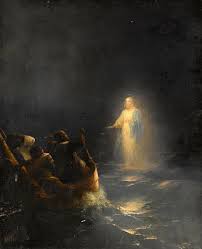Experiencing turbulence in the sea or in the air can be a good test of our faith in God. That is not to say that other forms of turbulence, be they mental, emotional, financial or political, don’t measure up. What matters is how quickly we rise and face life with fortitude.
In the First Reading (1 Kings 19: 9, 11-13) of the nineteenth Sunday of Ordinary Time, Elijah finds himself in a predicament. To escape the wrath of the people of Israel, whom he has denounced for worshipping false gods, he has taken refuge in a cave. Elijah awaits God’s intervention on that mountain (Horeb, aka Sinai) where, four centuries earlier, God had revealed Himself to Moses. There comes the hurricane, earthquake and fire, but God was in none of them. Finally, Elijah hears the soft whisper of a voice directing him to replace the kings of Syria and Israel, and to appoint Elisha to succeed him as prophet.
That is to say, the kingdom gloriously inaugurated with David and Solomon is now destined to disappear. Through the unfaithfulness of ungodly people even those who stand by God are destined to witness miserable scenes and suffer ordeals. In our times, don’t we let ourselves be blinded by the city lights and be deafened by a babel of sound? All those signs of pollution ensure that God is shut out from human affairs. No wonder there comes about a spiritual void that disrupts our peace of heart. Here, the solution lies in trusting not the world but God alone and in attuning ourselves to His will, which is discernible through prayerful silence.
The Gospel (Mt 14: 22-33) shows how Jesus entered into communion with the Heavenly Father through prayer. The passage preceding it on the eighteenth Sunday (Mt 14: 13-21, which we missed in view of the Feast of the Transfiguration) dealt with the celebrated multiplication of the loaves and fishes. After letting the crowds disperse, Jesus is known to have gone up to a mountain to pray. A mountain is a symbol of proximity to God and, by separating us from the madding crowd below, lets us appreciate the sweet sound of silence. This is not a form of escapism but the reverent fulfilment of a duty to spend quality time with our Creator.
It was then already “the fourth watch of the night” (between 3 a.m. and 6 a.m.) when Jesus descended to the plains. His fishermen disciples were at work, a few miles offshore. Seeing them tossed about by the waves, He reached out to them. They were afraid at first, superstitiously taking him to be a ghost walking over the waves, but livened up when Jesus announced that it was Him. Impulsively daring, Peter walked on the water with faith; yet, on experiencing the wind’s fury once again, felt insecure. Jesus addressed him in the words He does to us today: “O you of little faith, why did you doubt?”

In Abbé C. Fouard’s view, “The effect which this sudden stilling of the tempest had upon the disciples’ minds was altogether different from the enthusiasm caused by the multiplying of the loaves. ‘They had not grasped the lesson of the loaves,’ says St Mark, mournfully, ‘so dulled were their hearts.’ Too dull and too sordid of soul to conceive of any spiritual kingdom as yet (…) When they saw that He meant to refuse the sceptre now offered Him, they were so sore at heart and so dissatisfied that they quite forgot the almighty attributes of their Lord, and dared to resist His commands. It required a night of anguish and terror, like this through which they had passed, to bring them to a knowledge of their fault. But this trial tore the veil from their eyes; as they beheld Jesus bidding the roaring floods be still, and holding the powers of nature beneath His feet, they recognized ‘He it was, that spread out heaven to be his covering, made ocean a floor under his feet’ [Psalm 104: 2]. Throwing themselves on their faces before Him, they worshipped and adored Him, saying: ‘Thou art indeed the Son of God.’”[1]
Today, you and I toss hard in the bark of Peter that is the Catholic Church. In the course of her long history, we have, as a matter of course, witnessed very marvellous things, and at other times, the most appalling and distressful things as well. Let us not overthink and overreact, nor ever lose hope. Let us collect our thoughts, reaffirm our resolve, act with determination, and above all, hope and pray that Peter and his disciples will not let the bark sink….
Finally, let us behold the example of St Paul who trusted in the Lord through thick and thin. In today’s Second Reading (Rom 9: 1-5), he is ready to do anything for the salvation of the Jews, even to the point of excluding himself from God’s favour! So, did God fail, or at least fail him? How to account for the so-called Chosen Race’s lukewarm response to Jesus? The genial Apostle answers this question in three parts, in the present chapter (9) and in the two that follow (10, 11), throughout endorsing God’s ways and praising His unstinted fidelity to His promises. As the Psalm (84: 13-14) says, let us firmly believe that
The Lord will make us prosper
and our earth shall yield its fruit,
Justice shall march before him
and peace shall follow his steps.
Banner: https://rb.gy/judir
[1] Abbé C. Fouard, Jesus Christ the Son of God. Goa: Don Bosco, 1960, p. 235.
Thank you, Oscar. As always – a very compelling read
Óscar, I have been taking more from these reflections than from the Sunday homilies in our Church. Part of the problem is my hearing ,but the richness of the content in this blog is unparalleled. Perhaps this is one of the attributes that a Synodal Church is expected to foster. Thank you.